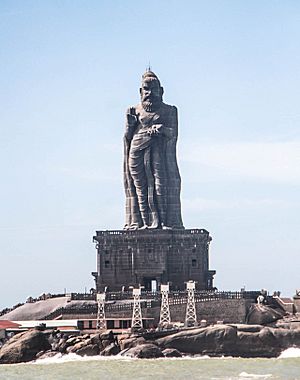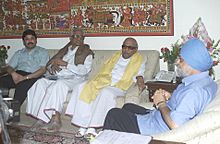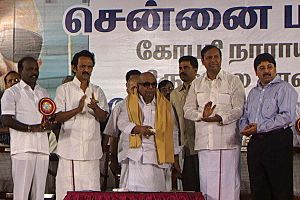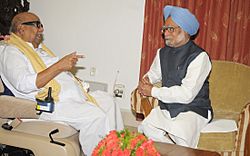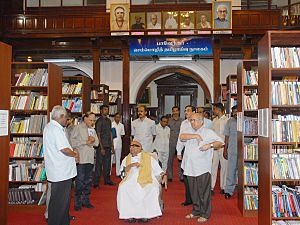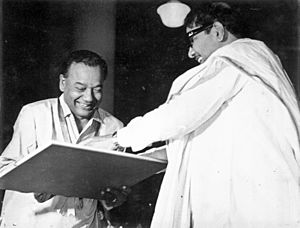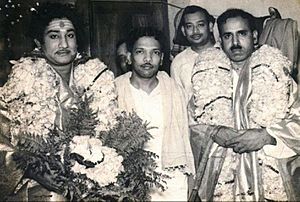M. Karunanidhi facts for kids
Quick facts for kids
M. Karunanidhi
|
|||||||||||||||||
|---|---|---|---|---|---|---|---|---|---|---|---|---|---|---|---|---|---|
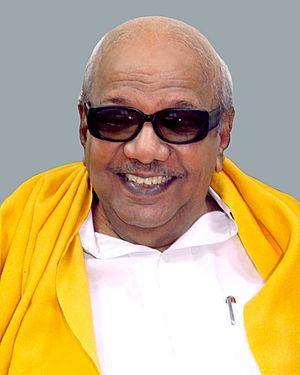
Official portrait of Karunanidhi
|
|||||||||||||||||
| 2nd Chief Minister of Tamil Nadu | |||||||||||||||||
| In office 13 May 2006 – 15 May 2011 |
|||||||||||||||||
| Governor | Surjit Singh Barnala | ||||||||||||||||
| Deputy | M. K. Stalin (from 2009) |
||||||||||||||||
| Preceded by | J. Jayalalithaa | ||||||||||||||||
| Succeeded by | J. Jayalalithaa | ||||||||||||||||
| Constituency | Chepauk | ||||||||||||||||
| In office 13 May 1996 – 13 May 2001 |
|||||||||||||||||
| Governor | Marri Chenna Reddy (1996) Krishan Kant (Addition Charge) (1996–1997) M. Fathima Beevi (from 1997) |
||||||||||||||||
| Preceded by | J. Jayalalithaa | ||||||||||||||||
| Succeeded by | J. Jayalalithaa | ||||||||||||||||
| Constituency | Chepauk | ||||||||||||||||
| In office 27 January 1989 – 30 January 1991 |
|||||||||||||||||
| Governor | P. C. Alexander (until 1990) Surjit Singh Barnala (from 1990) |
||||||||||||||||
| Preceded by | President's rule | ||||||||||||||||
| Succeeded by | President's rule | ||||||||||||||||
| Constituency | Chennai Harbour | ||||||||||||||||
| In office 10 February 1969 – 31 January 1976 |
|||||||||||||||||
| Governor | Ujjal Singh (until 1971) Kodardas Kalidas Shah (from 1971) |
||||||||||||||||
| Preceded by | C. N. Annadurai | ||||||||||||||||
| Succeeded by | President's rule | ||||||||||||||||
| Constituency | Saidapet | ||||||||||||||||
|
|||||||||||||||||
| Member of the Tamil Nadu Legislative Assembly | |||||||||||||||||
| In office 27 January 1989 – 7 August 2018 |
|||||||||||||||||
| Constituency | Harbour (1989–1996) Chepauk (1996–2011) Thiruvarur (2011–2018) |
||||||||||||||||
| In office 1 April 1957 – 18 August 1983 |
|||||||||||||||||
| Constituency | Kulithalai (1957–1962) Thanjavur (1962–1967) Saidapet (1967–1977) Anna Nagar (1977–1983) |
||||||||||||||||
| Member of the Tamil Nadu Legislative Council | |||||||||||||||||
| In office 30 March 1984 – 1 November 1986 |
|||||||||||||||||
| Chief Minister | M. G. Ramachandran | ||||||||||||||||
| Preceded by | K. A. Krishnasway | ||||||||||||||||
| Succeeded by | position abolished | ||||||||||||||||
| 1st President of Dravida Munnetra Kazhagam | |||||||||||||||||
| In office 27 July 1969 – 7 August 2018 |
|||||||||||||||||
| General Secretary |
|
||||||||||||||||
| Preceded by | position established | ||||||||||||||||
| Succeeded by | M. K. Stalin | ||||||||||||||||
| Personal details | |||||||||||||||||
| Born |
Muthuvel Karunanidhi
3 June 1924 Thirukuvalai, Madras Presidency, British India (present-day Tamil Nadu, India) |
||||||||||||||||
| Died | 7 August 2018 (aged 94) Chennai, Tamil Nadu, India |
||||||||||||||||
| Resting place | Kalaignar Karunanidhi Ninaividam | ||||||||||||||||
| Political party | Dravida Munnetra Kazhagam | ||||||||||||||||
| Other political affiliations |
Justice Party, Dravidar Kazhagam (before 1949) | ||||||||||||||||
| Spouse |
|
||||||||||||||||
| Children | 6, including M. K. Muthu, M. K. Alagiri, M. K. Stalin and Kanimozhi Karunanidhi | ||||||||||||||||
| Relatives | Karunanidhi family | ||||||||||||||||
| Residences |
|
||||||||||||||||
| Awards | Honorary Doctorate (1971) | ||||||||||||||||
| Signature |  |
||||||||||||||||
| Nicknames | Kalaignar, Mutthamizh Arignar | ||||||||||||||||
| En uyirinum melana anbu udan pirappukkale ("My beloved siblings who are esteemed loftier than my life") |
|||||||||||||||||
Muthuvel Karunanidhi (3 June 1924 – 7 August 2018) was an important Indian writer and politician. He served as the Chief Minister of Tamil Nadu for nearly two decades, holding the position five times between 1969 and 2011. People often called him Kalaignar (Artist) and Mutthamizh Arignar (Tamil Scholar) because of his great work in Tamil literature.
He was the longest-serving Chief Minister of Tamil Nadu, staying in office for 6,863 days. He was also a long-time leader of the Dravidian movement and served as president of the Dravida Munnetra Kazhagam political party ten times. Karunanidhi holds a special record: he never lost an election to the Tamil Nadu Assembly, winning 13 times since his first victory in 1957. Before becoming a politician, he worked as a screenwriter in the Tamil film industry. He also wrote many stories, plays, novels, and a multi-volume memoir. Karunanidhi passed away on 7 August 2018, in Chennai, after a long illness due to old age.
Karunanidhi was born in the village of Thirukkuvalai, Tamil Nadu, on 3 June 1924. He grew up in a society where people were treated differently based on their birth. This made him understand the challenges faced by those from lower social groups. At 14, he joined a student movement against making Hindi the national language of India. This was a first step towards his bigger anti-Hindi protests in 1965. As a high school student, he started the Tamil Nadu Tamil Manavar Mandram, the first student group of the Dravidian movement. He also started a newspaper called Murasoli, which later became the official publication of his political party, DMK. Karunanidhi loved writing from a young age, especially for plays and movies. He used his writing to share ideas about social reform. He wrote the script for M. G. Ramachandran's first film as a hero, Rajakumari, and for Sivaji Ganesan's first film, Parasakthi. He believed in rationalism and was against old superstitions.
Karunanidhi began his political journey in 1957 when he was elected to the Madras state legislature. He quickly rose in his party, the DMK. After the death of C. N. Annadurai in 1969, Karunanidhi became the DMK's leader and the Chief Minister of Tamil Nadu. He led his party to a big win in the 1971 elections. He was inspired by the ideas of Periyar and C.N. Annadurai, who believed in equality for all. Karunanidhi was one of the leaders who opposed Indira Gandhi's Emergency in 1975, which led to his government being removed in 1976. He became Chief Minister again in 1989, 1996, and 2006. He was known for fighting for more power for states and for helping people from lower social groups. He introduced a system to reserve government jobs and school places for them. He also started programs to help poor people. These ideas were later used in other Indian states. He was also key in building a 133-foot statue of Thiruvalluvar and helping the Tamil language become a classical language.
Contents
- Early Life and Family
- Starting in Politics and Writing
- Early Political Journey
- First Term as Chief Minister (1969–1971)
- Second Term as Chief Minister (1971–1976)
- Leader of the Opposition (1977–1983)
- Third Term as Chief Minister (1989–1991)
- Leader of the DMK (1991–1996)
- Fourth Term as Chief Minister (1996–2001)
- Leader of the DMK (2001–2006)
- Fifth Term as Chief Minister (2006–2011)
- Leader of the DMK (2011–2016)
- Political Policies
- Screenwriting
- Literature
- Personal Life
- Illness, Death, and Reactions
- Awards and Titles
- Elections and Positions Held
- Images for kids
- See Also
Early Life and Family
Karunanidhi was born on 3 June 1924, in the village of Thirukkuvalai in Nagapattinam district, Madras Presidency. His parents were Muthuvel and Anjugam. He had two older sisters, Periyanayaki and Shanmugasundari.
Growing up, Karunanidhi's father wanted him to learn music. However, he faced disrespect during his music lessons because of his family's social background. He refused to learn in such an environment. His father then arranged for special tutoring for him.
At 12, he moved to Thiruvarur for high school. There, he started organizing students for the Anti-Hindi agitations. He was deeply affected by the deaths of two protesters. At 13, he wrote his first Tamil historical novel, Selvachandira.
Starting in Politics and Writing
Karunanidhi entered politics at 14, inspired by a speech from the Justice Party. He took part in the Anti-Hindi agitations. He was drawn to the writings of Tamil leaders like Periyar. In 1938, he organized a group of boys to protest against making Hindi education mandatory. This law was later removed in 1939.
At 15, Karunanidhi started his own magazine, Maanavanesan (meaning "friends of students"). He and his friends would make copies and send them to leaders of the Self-Respect movement. Later, he started Murasoli to share his writings more widely. This magazine became important in fighting against social inequality. He wrote articles criticizing the old social system. When he was 18, C.N. Annadurai was surprised to meet him, expecting an older writer.
Karunanidhi faced challenges in his studies and decided to focus on writing. He began writing and staging plays in Thiruvarur. These plays helped spread the ideas of the Dravidian movement. His first play, Palaniappan, was staged to raise money for his student association.
His parents wanted him to get a regular job, but he was determined to be a writer. He later married Padmavathi Ammal in a simple ceremony without traditional priests, following the Self-Respect movement's ideas. They had a son, M. K. Muthu. After Padmavathi passed away, he married Dayalu Ammal. They had three sons, M. K. Alagiri, M. K. Stalin, and M. K. Tamilarasu, and a daughter, M. K. Selvi. Later, he married Rajathi Ammal, and they had a daughter, Kanimozhi.
Karunanidhi's plays became popular, especially in Pondicherry. He was even attacked by political opponents for his writings. After this, he worked as an assistant editor for Periyar's Kudi Arasu magazine for a year.
Early Political Journey
Karunanidhi, along with other young Tamil enthusiasts led by Annadurai, formed the Dravida Munnetra Kazhagam (DMK) on 17 September 1949.
Kallakudi Protest
One of his first big protests was the Kallakudi demonstration in 1953. The town's original name was Kallakudi, but it was renamed "Dalmiapuram" by the government. The DMK wanted the name changed back. Karunanidhi and his friends protested by lying on the railway tracks. Six people died in the protest, and Karunanidhi was arrested and jailed for six months.
Entering the Assembly
At 33, Karunanidhi was elected to the Tamil Nadu Assembly from Kulithalai in 1957. He was one of 15 DMK members elected. In 1960, he became the DMK treasurer. He was re-elected in 1962 from Thanjavur and became the deputy leader of the opposition.
During this time, he started sending daily letters to his party members, calling them "udanpirappukal" (blood brothers). These letters explained the DMK's ideas and encouraged party members. He continued this practice for fifty years.
1965 Anti-Hindi Protests
The Anti-Hindi protests started again in 1965 when the central government announced that Hindi would be the only official language. The DMK organized rallies, and Karunanidhi was arrested and jailed for six months.
Becoming a Minister
In 1967, the DMK won a big majority in the elections, and Annadurai became Chief Minister. Karunanidhi was elected from Saidapet and became the Minister of Public Works. In 1969, Madras State was renamed Tamil Nadu. Karunanidhi was in charge of several important government departments.
First Term as Chief Minister (1969–1971)
On 3 February 1969, Chief Minister Annadurai passed away. On 9 February 1969, DMK members chose Karunanidhi to lead the party and become Chief Minister. He was sworn in on 10 February 1969. He kept most of Annadurai's ministers.
Karunanidhi faced tough questions in the Assembly. When an opposition member called his government "third rate," Karunanidhi famously replied, "Sorry, this is not third-rate government. This is a fourth-rate government." He meant that his government was made up of people from the lowest social groups, who were often looked down upon.
During this term, he made "self-respect marriages" legal. These marriages were simple ceremonies without traditional priests. He also started programs to help women and children. He set up a commission to identify disadvantaged groups and ensure they had fair representation in jobs and education. He also founded the Tamil Nadu Slum Clearance Board to build proper homes for people living in slums. His government also offered free eye surgeries for the blind.
Second Term as Chief Minister (1971–1976)
In March 1971, Karunanidhi's party allied with Indira Gandhi's Congress party. The DMK won a huge victory, taking 184 out of 234 seats. Karunanidhi was re-elected Chief Minister for the second time.
In 1972, Karunanidhi ordered that people from all social groups could become priests in public temples. However, the Supreme Court later overturned this decision. In 1974, Karunanidhi became the first Chief Minister of Tamil Nadu to raise the national flag on Independence Day at Fort St. George.
He launched the "Beggar rehabilitation scheme" in 1971, asking for donations to help homeless people. He also started a scheme to provide financial help to government employees' families if they lost their jobs or died. His government increased reservations for backward classes and scheduled castes/tribes. In 1973, women were allowed to join the police force for the first time.
The Emergency and Government Dismissal
Karunanidhi opposed the Emergency declared by Indira Gandhi in 1975. His government was removed on 31 January 1976, just 50 days before his term ended. Many DMK members, including his relatives, were jailed. Some suffered health issues due to harsh treatment. Karunanidhi supported the families of jailed party members.
Leader of the Opposition (1977–1983)
After losing the 1977 elections, Karunanidhi became the leader of the opposition. He continued to protest against Indira Gandhi for dismissing his government. He was arrested again for leading protests.
In 1982, Karunanidhi walked about 200 kilometers from Madurai to Tiruchendur to demand justice for a temple officer who died under suspicious circumstances. Many people joined his walk, and it became a big event.
Third Term as Chief Minister (1989–1991)
After 13 years, the DMK returned to power in 1989. Karunanidhi became Chief Minister for the third time.
He introduced laws to help widows and encourage inter-caste marriages. In 1989, Tamil Nadu became the first state to reserve 30% of government jobs for women. His government also provided free electricity connections to farmers. Women's self-help groups were started to help women become self-employed.
His government was removed in 1991 by the central government due to accusations of supporting a separatist group in Sri Lanka.
Leader of the DMK (1991–1996)
After the assassination of Rajiv Gandhi in 1991, Karunanidhi's party faced accusations, and many DMK properties were damaged. The AIADMK-Congress alliance won the elections, and Jayalalithaa became Chief Minister. Only Karunanidhi won his seat from the DMK.
Fourth Term as Chief Minister (1996–2001)
In 1996, Karunanidhi formed an alliance and was elected Chief Minister for the fourth time.
He introduced the free bus pass system for government school and college students. He started the Uzhavar Sandhai plan in 1999 to help farmers sell their produce directly to consumers. He also opened the Samathuvapuram (Equality Village) schemes in 1998 to reduce social differences. His government helped boost the IT industry and introduced mini-buses for better transport. Karunanidhi also renamed Madras to Chennai to highlight Tamil identity. He started a scheme for free education for the first graduate in a family. He also helped rickshaw-pullers find new jobs and introduced a marriage assistance scheme for poor women. His government reserved 33% of local government positions for women.
He was responsible for many big projects, including the TIDEL Park, the Coimbatore flyover, the Koyambedu bus terminal, the Gemini flyover, and the Anna Centenary Library.
Thiruvalluvar Statue
In 1975, Karunanidhi's government planned to build a statue for Thiruvalluvar in Kanyakumari. The project was restarted in 1990 and again in 1996. He finally unveiled the 133-foot monument on New Year's Day, 2000.
Leader of the DMK (2001–2006)
He continued to serve as the president of the DMK. In 2004, he left his alliance with the BJP and joined the Congress-led United Progressive Alliance. This alliance won all 39 parliamentary seats from Tamil Nadu.
Fifth Term as Chief Minister (2006–2011)
On 8 May 2006, Karunanidhi became Chief Minister for the fifth time. His government immediately lowered rice prices and waived loans for farmers.
In 2006, the DMK government created 30 special welfare boards to help disadvantaged people. He also started the 'Anaithu Grama Anna Marumalarchi Thittam' to build libraries in every village. In 2006, he launched a scheme to give free land to poor, landless families. He also made it mandatory for new government buildings to have ramps and elevators for people with disabilities. He reserved 3% of government jobs for physically challenged people.
In 2007, he started a free gas connection distribution scheme. In 2008, he announced that 1 kg of rice would be sold for ₹1 at government stores. In 2009, he introduced a special 3% reservation for the Arunthathiyar community. He also launched the "Kalaignar Kapitu Thitam" in 2009, providing medical insurance for people from poor backgrounds. In 2010, he started the "Kalaignar Veetu Vasathi Thittam" to convert thatched huts into concrete houses. During this term, many new universities, highways, and flyovers were built. The Koyambedu bus terminal in Chennai, one of Asia's largest, was also built. His government also provided free color TVs and gas stoves to poor families.
Leader of the DMK (2011–2016)
In the 2011 elections, the DMK alliance lost. Karunanidhi won his seat from Tiruvarur. On his 86th birthday, he donated his home to a trust that would run a free hospital for the poor after his death.
In the 2016 elections, Karunanidhi won from Tiruvarur again, marking his 13th straight victory since 1957. In January 2017, due to his declining health, his son M.K. Stalin was made the working president of the DMK.
Political Policies
Sri Lankan Tamil Issue
Karunanidhi was known as the "Tamil Inaththalaivar" (leader of the Tamil race) by his supporters. He was close to many Sri Lankan Tamil politicians. In 1956, he spoke out against Sri Lanka's 'Sinhala Only policy'. He supported protests in Tamil Nadu after violence against Tamils in Sri Lanka in 1977 and 1983.
He founded the Tamil Eelam Supporters Organisation (TESO) in 1986 to support the Tamil desire for self-rule in Sri Lanka. He criticized the violence between different Tamil groups. He also opposed sending Indian peace keeping forces to Sri Lanka. His government was dismissed in 1991 partly because of his actions regarding the Sri Lankan Tamil issue.
Tamil Language
Karunanidhi greatly admired Thiruvalluvar, a famous Tamil poet. The DMK government built Valluvar Kottam, a memorial in Chennai dedicated to Valluvar. He also built the Silappadikaram Art Gallery in Poompuhar and a special department for Tamil language development. In 2006, his government made Tamil compulsory in all schools up to Class 10. Karunanidhi was a strong supporter of keeping English as an additional language in schools. In 2004, he played a key role in getting Tamil recognized as a classical language.
World Tamil Conference
He gave speeches at the World Tamil Conferences in Paris (1970) and Kuala Lumpur (1987). He also wrote the official theme song, "Semmozhiyaana Tamizh Mozhiyaam", for the World Classical Tamil Conference 2010, with music by A. R. Rahman.
In June 2010, his government organized the World Classical Tamil Conference in Coimbatore. Karunanidhi spoke about the importance of Tamil among classical languages. He also pushed for Tamil to be recognized as a language for the Madras High Court. He announced the creation of the World Tholkappiyar Classical Tamil Sangam to promote Tamil research globally.
Screenwriting
Karunanidhi started his career as a screenwriter in the Tamil film industry. His first film as a screenwriter was Rajakumari (1947), starring M. G. Ramachandran. This film made him very popular. He also wrote for other films starring M.G. Ramachandran, like Abhimanyu (1948) and Marudhanaattu Ilavarasi (1950).
His most famous movie was Parasakthi (1952). This film was a turning point in Tamil cinema because it promoted the ideas of the Dravidian movement. It also introduced two major actors, Sivaji Ganesan and S. S. Rajendran. The movie faced some problems at first but became a big hit. It criticized social inequalities and old religious practices.
Other movies he wrote, like Panam (1952) and Thangarathnam (1960), also shared important social messages. These films talked about things like allowing widows to remarry, ending untouchability, and promoting self-respect marriages. He continued writing for films even during his political career, with his last film being Ponnar Shankar in 2011.
Writing Style
Karunanidhi quickly became a popular politician because of his cleverness and speaking skills. His movies and plays often had strong social messages. He used Tamil cinema to spread his political ideas, especially those of the Dravidian movement, which focused on social equality and rationalism. His writings often criticized upper social groups and promoted secularism.
Literature
Karunanidhi made great contributions to Tamil literature. He wrote poems, letters, screenplays, novels, biographies, historical novels, plays, and movie songs. He wrote Kuraloviam about the ancient text Thirukural, and books like Tholkaappiya Poonga and Poombukar. He also contributed to Tamil language through art and architecture. He built Valluvar Kottam in Chennai, a memorial to Thiruvalluvar. He also built the 133-foot-high statue of Thiruvalluvar in Kanyakumari.
Books
Some of his books include Sanga Thamizh, Thirukkural Urai, Ponnar Sankar, Romapuri Pandian, Thenpandi Singam, Vellikizhamai, Nenjukku Needhi, Iniyavai Irubathu, and Kuraloviam. He wrote over 100 books of prose and poetry.
Stage Plays
His stage plays include: Manimagudam, Ore Ratham, Palaniappan, Thooku Medai, Kagithapoo, Naane Arivali, Vellikizhamai, Udhayasooriyan, and Silappathikaram.
Personal Life
Karunanidhi married three times. His first marriage was to Padmavathi Ammal in 1944, following the Self-Respect movement's style. They had one son, M. K. Muthu. Padmavathi passed away in 1948. Later that year, he married Dayalu Ammal. They had three sons, M. K. Alagiri, M. K. Stalin, and M. K. Tamilarasu, and a daughter, M. K. Selvi. His sons Alagiri and Stalin are also active in politics. With his third marriage to Rajathi Ammal, he had a daughter, Kanimozhi.
In 1953, Karunanidhi was in a car accident that injured his left eye. Doctors advised him to wear sunglasses to protect his eyes. He started wearing his famous dark glasses in 1971.
Since 2004, his health declined, and he became dependent on a wheelchair after a spinal operation. He used a motorized wheelchair and a special van to help him move around easily.
Illness, Death, and Reactions
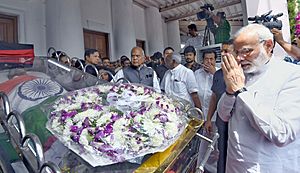
Karunanidhi became unwell in October 2016. He was hospitalized in December 2016 for infections and had a tracheostomy surgery to help him breathe. He made few public appearances after that. His last public appearance was on 3 June 2018, for his 94th birthday.
On 28 July 2018, his health worsened and became critical. He was admitted to Kauvery Hospital in Chennai. He passed away there at 6:10 p.m. on 7 August 2018, due to age-related illness and organ failure.
The government of Tamil Nadu declared a public holiday and seven days of mourning after his death. The Indian government announced a national mourning day on 8 August 2018, with the national flag flying at half-mast. The governments of Karnataka and Bihar also announced state mourning.
The DMK party later stated that 248 party workers died from shock after Karunanidhi's passing and announced financial help for their families.
Awards and Titles
- Annamalai University gave him an honorary doctorate in 1971.
- He received the "Raja Rajan Award" from Tamil University, Thanjavur, for his book Thenpandi Singam.
- On 15 December 2006, he received an honorary doctorate from Madurai Kamaraj University.
- In June 2007, the Tamil Nadu Muslim Makkal Katchi announced they would give him the title "Friend of the Muslim Community" (Yaaran-E-Millath).
Elections and Positions Held
Karunanidhi won every Tamil Nadu Assembly election he contested since 1957, except in 1984 when he did not run. He holds the record for never losing an election he participated in.
- Chief Minister of Tamil Nadu: 5 terms (1969–1971, 1971–1976, 1989–1991, 1996–2001, 2006–2011)
- Leader of the Opposition in Tamil Nadu Legislative Assembly: 2 terms (1977–1980, 1980–1983)
- Member of the Tamil Nadu Legislative Assembly: 13 terms (1957–1983, 1989–2018)
- President of Dravida Munnetra Kazhagam: 10 terms (1969–2018)
Images for kids
See Also
- List of political families
- List of Indian writers
- Karunanidhi family
 | Calvin Brent |
 | Walter T. Bailey |
 | Martha Cassell Thompson |
 | Alberta Jeannette Cassell |


